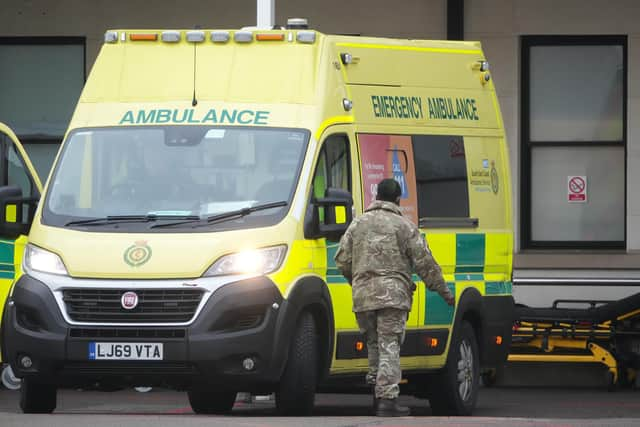Ambulance workers strike: NHS issues new guidance
and live on Freeview channel 276
The advice comes from the NHS which is urging people to ‘use services wisely’ during industrial action. Thousands of ambulance workers across England and Wales are on strike today (Wednesday).
An NHS spokesperson said: “The NHS is already facing record demand on urgent and emergency care services – October and November were the busiest on record for A&E attendances and the most serious ambulance callouts.
Advertisement
Hide AdAdvertisement
Hide Ad“Industrial action means these services will be under increased pressure so it is vital that people use the services available appropriately.


“Patients should continue to call 999 if anyone requires life-saving care with ambulance services prioritising the most clinically urgent cases.
"If it is not life-threatening you may have to wait longer than usual for an ambulance.
“General practice, community pharmacies, and dentistry are not impacted by strike action.
Advertisement
Hide AdAdvertisement
Hide Ad“The NHS is also asking the public to play their part by taking simple steps during industrial action to look after themselves, loved ones and checking in on vulnerable family members and neighbours.
“People can help by taking sensible measures to keep themselves and others safe during this period by not ending up in A&E – such as drinking responsibly or stocking up on their medication.”
Today nurses are striking in 44 NHS Trusts across England. Ambulance workers will be striking at nine out of 10 ambulance trusts tomorrow.
The spokesperson added: “Patients whose conditions are not life-threatening will have to wait longer than usual for an ambulance and, where safe and appropriate, may be asked to make their own way to hospital – although it is important that they get medical advice from 111 or 999 before doing so.
Advertisement
Hide AdAdvertisement
Hide Ad“In all cases, priority will be given to those patients with the most clinically urgent health needs.”
NHS medical Director Professor Sir Stephen Powis said: “There is no doubt that the NHS is facing extreme pressure and industrial action will add to the already record demand we are seeing on urgent and emergency care, and so it is really important that the public play their part by using services wisely.”
He added:“NHS staff have worked hard to minimise disruption but it is inevitable as with any industrial action that we will see an impact on services but it is vital if you need lifesaving care, to continue to come forward.”
The NHS says it has been preparing extensively for industrial action and for winter, with plans in place to manage additional demand including 24/7 control centres, additional bed capacity, more mental health support for ambulance services and more community falls services.
The NHS will contact anyone whose appointment has to be rescheduled due to strikes. People who are not contacted should attend appointments as planned.